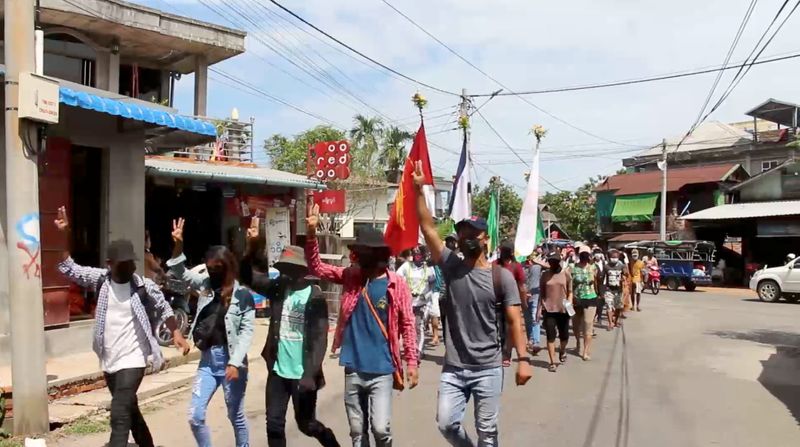(Reuters) -Myanmar's detained government leader Aung San Suu Kyi asked a court on Monday to be allowed to meet her lawyers in person when she appeared at a hearing via video link to face charges brought by the military junta that could see her jailed for years.
As Suu Kyi appeared, her supporters called for people to show their opposition to the Feb. 1 coup during this week's traditional new year holiday in the largely Buddhist country.
Suu Kyi, 75, who has led Myanmar's struggle against military rule for decades and who won the Nobel Peace Prize in 1991, has been detained since the coup and charged with various offences. These include violating a colonial-era official secrets act that could see her jailed for 14 years.
She has only been allowed to talk with her lawyers via video link in the presence of security officials and it is not known if she is even aware of the turmoil that has engulfed the country since the military seized power.
"No, we haven't, we could only talk about legal matters," lawyer Min Min Soe told Reuters when asked if her legal team had been able to talk to her about the protests in which more than 700 people have been killed.
The lawyer said Suu Kyi looked healthy as she repeated a request to meet her lawyers face-to-face. The next hearing is on April 26.
As well as the official secrets charge, Suu Kyi has been charged with illegally possessing two-way radios and violating coronavirus protocols. She has also been accused by the ruling military council of bribery.
Her lawyers say the charges were trumped up and they dismiss the accusation of bribery as a joke.
An additional complaint against her was filed on Monday related to the coronavirus rules, Min Min Soe said.
The coup has plunged Myanmar into crisis after 10 years of tentative steps towards democracy as the military stepped back from politics and allowed Suu Kyi to form a government after her party swept a 2015 election.
The military says it had to overthrow her government because a November election again won by her National League for Democracy was rigged. The election commission dismissed the accusation.
The coup has triggered relentless protests by those opposed to military rule, and unyielding suppression by the generals who say that only they can save the country from disintegration.
'POWER OF PEOPLE'
Security forces have killed 706 protesters, including 46 children, since the coup, according to a tally by the Assistance Association for Political Prisoners (AAPP) activist group.
That included 82 people killed in the town of Bago, about 70 km (45 miles) northeast of Yangon, on Friday.
Undaunted by the violence, activists called for defiance this week over the five-day traditional new year, known as Thingyan, which begins on Tuesday.
The most important holiday of the year is usually celebrated with prayers, ritual cleaning of Buddha images in temples, and high-spirited water-throwing on the streets.
"The military council doesn't own Thingyan. The power of people is in the hands of people," Ei Thinzar Maung, a leader of the General Strike Collaboration Committee protest group, wrote on Facebook (NASDAQ:FB).
Calling for a "people's Thingyan", Ei Thinzar Maung said Buddhists should wear certain religious attire and recite prayers together, for members of small Christian communities to wear white and read psalms, and for followers of other religions should to follow the lead of their leaders.
Reports on social media said security forces had opened fire in the northwestern town of Tamu on Monday and police had broken up a protest in the city of Mandalay.
Three civilians were killed in fighting between the army and ethnic minority Kachin insurgents in the north, the Irrawaddy online news service reported.

Details of the violence were difficult to obtain because of the junta's curbs on broadband internet and mobile data services.
A spokesman for the junta could not be reached for comment.